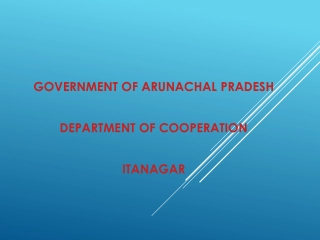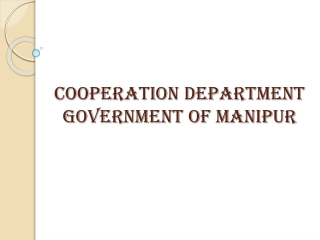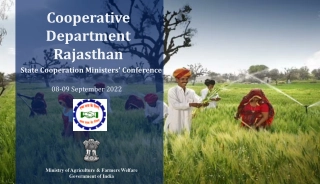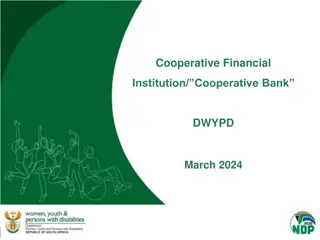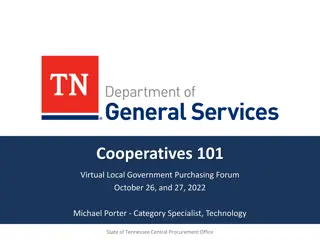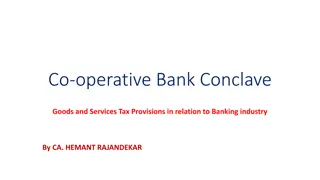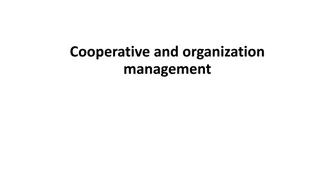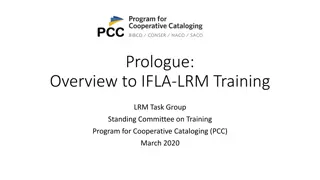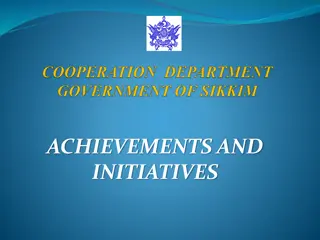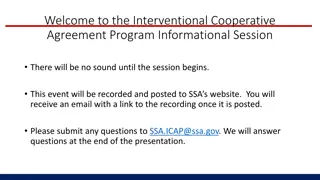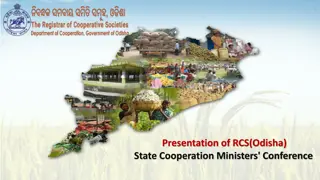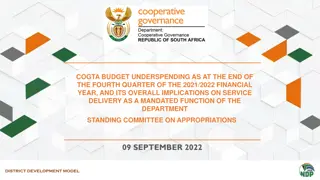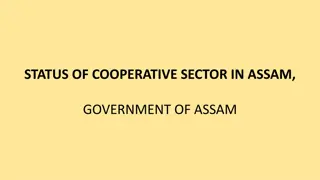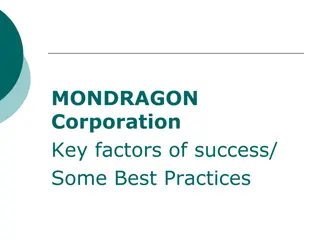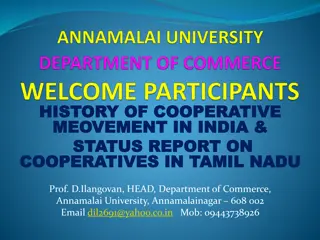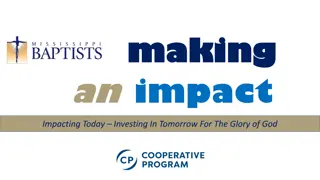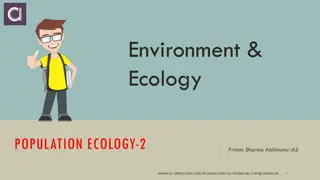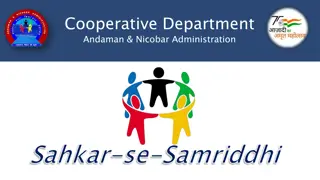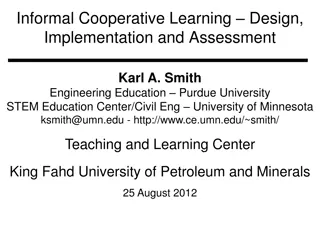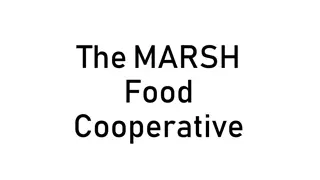Ministry of Cooperation National Cooperative Development Corporation
NCDC provides advance loans and grant subsidies to state governments and cooperative societies. It implements flagship government schemes and has a strong track record of disbursements. Find out more about their activities and how they support cooperative development.
6 views • 11 slides
Revised Strategic Plan 2020-25: Cooperative Governance & Traditional Affairs
The revised strategic plan for the Select Committee on Cooperative Governance and Traditional Affairs. It includes the annual performance plan for 2023/24 and the MTEF budget allocation.
2 views • 28 slides
Strengthening Cooperative Exports for Sustainable Growth
National Cooperative Exports Ltd. (NCEL) supports cooperative sector exports, leveraging government schemes, to benefit farmers and promote economic entities. The organization focuses on statutory approvals, structure with prominent promoters, and specialized export activities. Popular
0 views • 8 slides
Cooperative Societies in Arunachal Pradesh: Status and Categories
Explore the status of cooperative societies in Arunachal Pradesh with 1206 societies, 64540 members, and diverse categories from agriculture to finance. Learn about the state's two-tier Cooperative Credit Structure aiming to support farmers. Initiatives include setting up Customer Service Points wit
6 views • 15 slides
Presentation on Cooperative Sector of Mizoram at State Cooperation Ministers Conference
Mizoram's cooperative sector plays a crucial role in the state's economic development, especially in the challenging terrain. Initiatives, such as PACS computerization and revitalization efforts, aim to strengthen cooperative societies for sustainable growth. The presentation covers statutory works,
0 views • 18 slides
Cooperative Governance and Urban Planning in Gauteng: Support to Municipal Public Accounts Committees
The Department of Cooperative Governance, Urban Planning, and Traditional Affairs (COGTA) in Gauteng provides support to Municipal Public Accounts Committees (MPACs) for clean audits, anti-corruption measures, and more. Upholding the RSA Constitution, the department aims to drive effective cooperati
0 views • 52 slides
Cooperative Department of Manipur: Overview of Cooperative Movement
The Cooperative Department of Manipur is the primary agency of the government overseeing the Cooperative Movement in the state. Established in 1938, it aims to improve the socio-economic status of the people through cooperative societies. Currently, there are a significant number of registered coope
4 views • 25 slides
Cooperative Department Rajasthan State Initiatives Overview
Providing an insightful overview of cooperative initiatives in Rajasthan, the content delves into key areas such as registered societies, banking, marketing, and dairy cooperatives. It highlights significant IT initiatives, like online loan distribution and portal inaugurations, emphasizing the stat
1 views • 16 slides
Cooperative Credit Structure and Business Development in Andhra Pradesh
The cooperative credit structure in Andhra Pradesh, led by APCOB and DCCBs, is thriving with a focus on agricultural, MSME, and retail sectors. Business parameters show significant growth in deposits and loans over the years. Strategies for development emphasize farmer-centric approaches, technology
2 views • 16 slides
Understanding CONFIA: The Brazilian Cooperative Compliance Program
Cooperative Compliance is a relationship between taxpayers and Tax Administration based on principles like good faith, collaboration, and transparency. CONFIA aims to provide legal certainty, prevent disputes, reduce compliance costs, and improve tax compliance through voluntary and cooperative deve
1 views • 14 slides
Farmer Cooperative's Innovative Poultry Composting Project
Farmer cooperative Fertil Eveil is leading an innovative project focused on producing and sharing compost from plant-based litter within a Practice Hub environment. With multiple composting platforms established in France, the cooperative aims to improve nutrient management and assess the impact of
3 views • 6 slides
Establishment of Cooperative Financial Institution/Cooperative Bank for Financial Inclusion
The initiative focuses on establishing a women-owned Cooperative Banking Institution to promote financial inclusion for women, youth, and persons with disabilities. The process involves coordination with stakeholders, submitting proposals, conducting awareness campaigns, and setting up minimum requi
0 views • 13 slides
Comprehensive Guide to Cooperative Contracts in Local Government Purchasing
This content provides detailed information on cooperatives, their benefits, types, operating models, and reasons for utilization in government purchasing. It outlines who can use cooperative contracts and highlights the advantages of leveraging such agreements for efficiency and savings in procureme
1 views • 30 slides
Emerging Trends in Cooperative Education: A Comprehensive Overview by Prof. D. Ilangovan, HD
Welcome to the Department of Commerce where Prof. D. Ilangovan shares insights on emerging trends in cooperative education. Education and training are vital for the success of cooperative movements, aiming to educate members and leaders on cooperative principles and practices. The focus is on cooper
0 views • 16 slides
Analysis of GST Provisions in the Banking Industry
The Goods and Services Tax (GST) regime replaced the old service tax regime on July 1, 2017. In the context of the banking industry, the provisions governing GST for services provided by Cooperative Banks and Banking Cooperative Societies are similar to those of the service tax regime. While interes
1 views • 13 slides
Understanding Cooperative and Organization Management
Cooperative and organization management involves the autonomous association of people working together to meet common economic, social, and cultural needs. The unique characteristics of cooperatives include autonomy, volunteerism, common needs, ownership, democratic control, and enterprise. Cooperat
0 views • 38 slides
Introduction to IFLA-LRM Training Program for Cooperative Cataloging (PCC)
This training program, conducted by the LRM Task Group of the Standing Committee on Training Program for Cooperative Cataloging (PCC) in March 2020, aims to provide an overview of the IFLA Library Reference Model (LRM) and its primary concepts. The training is structured with 12 modules covering dif
0 views • 5 slides
Cooperative Movement and Growth in Sikkim
Sikkim, the 22nd state of India, showcases a thriving cooperative movement with significant growth in the number of cooperative societies over the years. The state economy primarily revolves around agriculture, with major crops like rice, maize, and oranges. The cooperative sector in Sikkim is robus
1 views • 9 slides
Overview of Cooperative Game Theory and Bargaining Solutions
Cooperative game theory explores situations where players have mutual benefits in cooperating. The focus is on bargaining solutions to reach agreements despite conflicting interests. Key concepts include Nash Bargaining Solution, Kalai-Smorodinsky Bargaining Solution, and Rubinstein Bargaining Proce
1 views • 24 slides
Interventional Cooperative Agreement Program Informational Session
The Interventional Cooperative Agreement Program (ICAP) allows the SSA to collaborate with non-federal entities to conduct interventional research evaluating treatment efficacy. Priority topics include addressing labor market barriers for people with disabilities, promoting self-sufficiency, and coo
0 views • 17 slides
Cooperative Initiatives in Odisha: Enhancing Rural Development Through Cooperative Structures
The state of Odisha is at the forefront of promoting cooperative initiatives to support rural development. The presentation highlights the key aspects of the State Cooperation Ministers' Conference, the structure and functions of cooperative departments, the role of short-term cooperative credit, pr
4 views • 10 slides
Cooperative Ownership and Democratic Participation in Economic Models
Explore the principles of cooperative ownership, democratic participation, and economic models as advocated by Jessica Gordon-Nembhard. She emphasizes the historical significance of collective work, indigenous cooperative efforts, and the values of shared risk and surplus sharing in community-owned
0 views • 71 slides
Exploring Dual Credits and Cooperative Education Programs
Dual credit programs offer high school students the opportunity to earn college credits while completing their secondary education, potentially leading to a post-secondary diploma or Certificate of Apprenticeship. These programs aim to support students facing challenges in meeting graduation require
0 views • 7 slides
Department of Cooperative Governance and Traditional Affairs (COGTA) Budget Underspending Review
The presentation covers the underspending of the Department of Cooperative Governance and Traditional Affairs at the end of the 2021/2022 financial year, highlighting key areas such as departmental expenditure and performance, grants, and challenges faced by municipalities. It discusses the implicat
0 views • 33 slides
Empowering Black Communities Through Cooperative Enterprises
Explore the significance of cooperatives, credit unions, and circles in empowering Black communities, highlighting their role in economic, social, and cultural development. With over 760 million individuals benefiting from the Cooperative Advantage, these community-centered models prioritize people
1 views • 11 slides
Enhancing Academic and Personal Support through Cooperative Base Groups
Exploring the concept of cooperative base groups for academic and personal support in college settings, this collection highlights the benefits of social interdependence theory, the importance of maintaining a balance between academic challenges and social support, and the role of creative tension i
0 views • 9 slides
Steps to Starting a Cooperative: A Comprehensive Guide
Explore the process of starting a cooperative from forming the initial idea to gathering information and asking key questions. Understand the different ways to start a co-op and the importance of member involvement. Discover the crucial steps to take when working with a member-initiated co-op, with
0 views • 35 slides
Understanding Social Hierarchies in Animal Behavior
Social behavior in animals involves living in social groups, establishing social hierarchies, and exhibiting dominance behaviors. Animals have developed various signals and behaviors to interact successfully within these groups. Social hierarchies offer advantages such as increased chances of surviv
1 views • 20 slides
Cooperative Sector in Assam: Overview and Current Status
The cooperative sector in Assam plays a vital role in the state's rural development, with a focus on self-sufficiency and economic upliftment. The government of Assam is actively working on strengthening cooperative movements, computerizing PACs, and forming constituency-level cooperative societies.
1 views • 11 slides
Key Factors of Success at MONDRAGON Corporation: Insights and Best Practices
The MONDRAGON Corporation, a leading economic group in the Basque Country, showcases key factors of success including the role of Caja Laboral, worker commitment, quality-based strategies, and reinvestment of profits. These elements contribute to sustainable growth and cooperative success within the
0 views • 18 slides
History and Principles of Cooperative Movement in India
Explore the history and principles of cooperative movement in India, including open membership, democratic control, and member participation. Learn about the values and definition of cooperatives, as well as the important role of members in a cooperative society. Delve into the key principles that g
1 views • 25 slides
Cooperative Water Heater Experiment Demonstrates Greenhouse Effect
Explore a 5th-grade cooperative experiment creating a water heater using a shoebox, plastic tube, and thermometer to showcase the greenhouse effect. By harnessing the properties of transparent plastic, this engaging activity illustrates how certain gases contribute to global warming.
0 views • 32 slides
Understanding the Power of Collaboration in Agency Services
Collaboration, a cooperative arrangement between parties working towards a common goal, is essential for knowledge sharing, conflict resolution, and maximizing resources. Despite misconceptions, agencies benefit from collaborating through networking, knowledge exchange, and increased funding opportu
0 views • 31 slides
Promoting Collaborative Environments for Cooperative Problem-Based Learning
Explore key concepts in creating, promoting, and structuring collaborative environments for cooperative problem-based learning in educational settings. Learn essential features of effective teamwork, high-performing teams, and formal cooperative learning. Discover strategies to increase student enga
0 views • 62 slides
Cooperative Movement in West Bengal: A Comprehensive Overview
This overview delves into the cooperative movement in West Bengal, highlighting key statistics such as the number of cooperative societies, members, PACS, and banks. It also covers aspects like enrolment of new members, crop loans disbursed, beneficiaries of crop loans, and issuance of medium to lon
0 views • 15 slides
Supporting Missionaries and Ministry: The Impact of Cooperative Program
Dive into how the Cooperative Program supports missions and ministry initiatives, distributing funds between the Southern Baptist Convention, Mississippi Baptist Convention, North American Mission Board, and International Mission Board. Discover the reach of 2,088 churches in Mississippi, aiding pas
0 views • 6 slides
Population Interactions in Nature: Competitive and Cooperative Interactions
Every population, whether animal or plant, engages in competitive and cooperative interactions to fulfill their needs for food, shelter, and resources. Intraspecific competition is common among individuals of the same species, leading to a struggle for survival. Interspecific interactions also play
0 views • 17 slides
Cooperative Movement in Andaman & Nicobar Islands: A Comprehensive Overview
The cooperative movement in Andaman & Nicobar Islands began in 1946 with the registration of the first society. Since then, the growth of cooperative societies has been significant, with a focus on various sectors like agriculture, fisheries, construction, tourism, and more. These cooperatives have
0 views • 13 slides
Informal Cooperative Learning: Design, Implementation, and Assessment in Education
Explore the concepts of informal cooperative learning, pedagogies of engagement, and challenge-based learning in educational settings. Learn about key features, objectives, and practical applications of cooperative learning methods. Reflect on your practice and engage in discussions to enhance teach
0 views • 26 slides
Unveiling the MARSH Food Cooperative: A Path to Generative Social Practices
Exploring the transformative journey of the MARSH Food Cooperative in Carondelet, a not-for-profit organization dedicated to designing human-scaled generative social practices. Discover their ethos of emergent, human-scaled, and generative approaches, aiming to prioritize respect and values over pro
0 views • 17 slides



